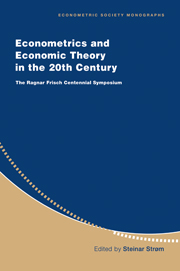Book contents
- Frontmatter
- PART I RAGNAR FRISCH AND HIS CONTRIBUTIONS TO ECONOMICS
- PART II UTILITY MEASUREMENT
- PART III PRODUCTION THEORY
- PART IV MICROECONOMIC POLICY
- PART V ECONOMETRIC METHODS
- 10 Scientific Explanation in Econometrics
- 11 An Autoregressive Distributed-Lag Modelling Approach to Cointegration Analysis
- 12 Econometric Issues Related to Errors in Variables in Financial Models
- 13 Statistical Analysis of Some Nonstationary Time Series
- PART VI MACRODYNAMICS
- PART VII MACROECONOMIC PLANNING
- Author Index
- Subject Index
11 - An Autoregressive Distributed-Lag Modelling Approach to Cointegration Analysis
from PART V - ECONOMETRIC METHODS
Published online by Cambridge University Press: 05 January 2013
- Frontmatter
- PART I RAGNAR FRISCH AND HIS CONTRIBUTIONS TO ECONOMICS
- PART II UTILITY MEASUREMENT
- PART III PRODUCTION THEORY
- PART IV MICROECONOMIC POLICY
- PART V ECONOMETRIC METHODS
- 10 Scientific Explanation in Econometrics
- 11 An Autoregressive Distributed-Lag Modelling Approach to Cointegration Analysis
- 12 Econometric Issues Related to Errors in Variables in Financial Models
- 13 Statistical Analysis of Some Nonstationary Time Series
- PART VI MACRODYNAMICS
- PART VII MACROECONOMIC PLANNING
- Author Index
- Subject Index
Summary
Introduction
Econometric analysis of long-run relations has been the focus of much theoretical and empirical research in economics. In cases in which the variables in the long-run relation of interest are trend-stationary, the general practice has been to de-trend the series and to model the de-trended series as stationary autoregressive distributed-lag (ARDL) models. Estimation and inference concerning the long-run properties of the model have then been carried out using standard asymptotic normal theory. For a comprehensive review of this literature, see Hendry, Pagan, and Sargan (1984) and Wickens and Breusch (1988). The analysis becomes more complicated when the variables are difference-stationary, or integrated of order 1 [I(1) for short]. The recent literature on cointegration has been concerned with analysis of the long-run relations between I(1) variables, and its basic premise has been, at least implicitly, that in the presence of I(1) variables the traditional ARDL approach is no longer applicable. Consequently, large numbers of alternative estimation and hypothesis-testing procedures have been specifically developed for the analysis of I(1) variables. See the pioneering work of Engle and Granger (1987), Johansen (1991), Phillips (1991), Phillips and Hansen (1990), and Phillips and Loretan (1991).
- Type
- Chapter
- Information
- Econometrics and Economic Theory in the 20th CenturyThe Ragnar Frisch Centennial Symposium, pp. 371 - 413Publisher: Cambridge University PressPrint publication year: 1999
- 896
- Cited by



